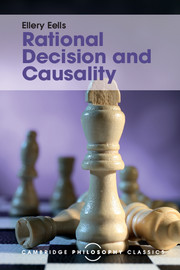Book contents
- Frontmatter
- Dedication
- Contents
- Preface to this edition
- Preface
- Introduction
- 1 Bayesianism
- 2 The philosophical and psychological significance of Bayesian
- 3 Bayesian decision theories: some details
- 4 The counterexamples
- 5 Causal decision theories
- 6 Common causes, reasons and symptomatic acts
- 7 A general defense of PMCEU
- 8 Newcomb's paradox
- Appendix 1 Logic
- Appendix 2 Probability
- Bibliography
- Index
- Frontmatter
- Dedication
- Contents
- Preface to this edition
- Preface
- Introduction
- 1 Bayesianism
- 2 The philosophical and psychological significance of Bayesian
- 3 Bayesian decision theories: some details
- 4 The counterexamples
- 5 Causal decision theories
- 6 Common causes, reasons and symptomatic acts
- 7 A general defense of PMCEU
- 8 Newcomb's paradox
- Appendix 1 Logic
- Appendix 2 Probability
- Bibliography
- Index
Summary
In this chapter, I will present two prima facie counterexamples to Jeffrey's PMCEU of the kind inspired by Newcomb's paradox, briefly describe a number of others of the same general kind and try to clarify their structure. Newcomb's paradox itself will be discussed in Chapter 8.
The prima facie counterexamples are best understood as establishing a prima facie conflict between PMCEU and another intuitively plausible and well-respected principle of choice which, though not very broadly applicable, is almost certainly true. The second principle is a revised version of Savage's principle of dominance that takes into account the possibility that the states are not act-independent. Henceforth, when referring to the principle of dominance (PDOM, for short), I shall be referring to the revised version, stated below.
PDOM will here be given a propositional formulation. That is, the acts, states and outcomes referred to in my statement of the principle will be propositions, à la Jeffrey, to the effect that the agent performs such and such an act, that such and such state of the world obtains and that such and such an outcome accrues to the agent, respectively. To state PDOM, I must first give the following definition: Where A and B are any available acts and {F1, … Fr} is any set of mutually exclusive and collectively exhaustive decision-relevant propositions, A dominates B in the agent's preferences relative to {F1, … Fr} if, and only if, D(A & Fi) > D(B & Fi), for i = 1, … r. PDOM states: If (i) some act, A, dominates every other act in your preferences relative to some partition and (ii) you believe that which act you perform does not causally affect which element of that partition is true, then do A.
Let the states and outcomes considered by the agent be as labeled in the section on Jeffrey in the previous chapter. Then a consequence of PDOM, a weaker version, relies on the following definition: For any acts A and B, A dominates B in the agent's preferences if, and only if, for any two (maximally specific) decision-relevant propositions of the forms A & Si & Oj and B & Si & Oj, D(A & Si, & Oj) > D(B & Si & Oj).
- Type
- Chapter
- Information
- Rational Decision and Causality , pp. 79 - 86Publisher: Cambridge University PressPrint publication year: 2016

